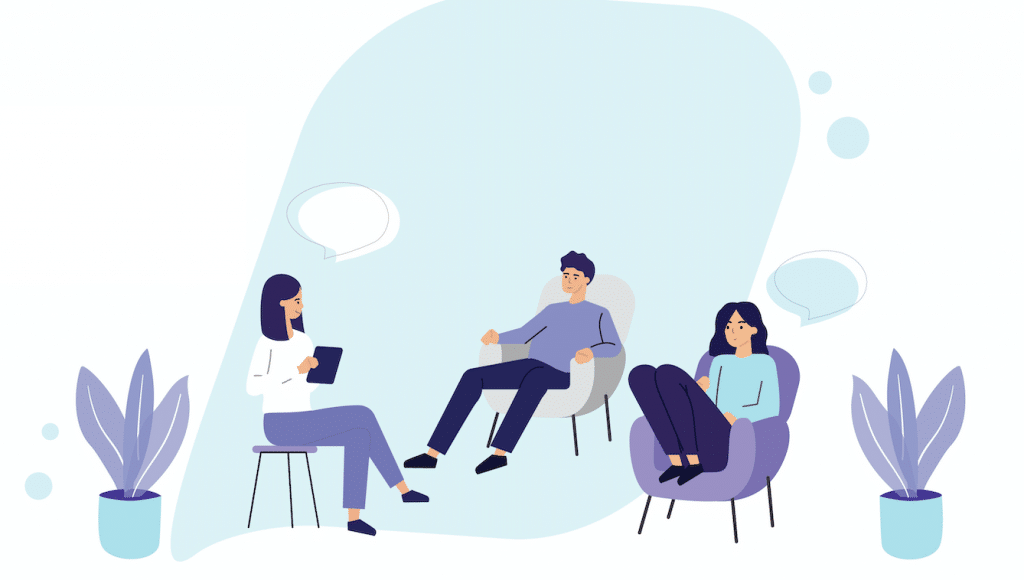Counselling Session – What to Expect and How to Prepare
Waiting for your first counselling session can be a nerve-racking experience. It is common to feel nervous, uncertain, and perhaps even apprehensive initially. Clients who have previously gone for counselling, too, may find it tricky navigating the landscape as counselling sessions increasingly go virtual. Thankfully, there are simple things you can do before your counselling session to help you feel prepared for the session.
This article covers what you can expect in your first counselling session, as well as some ways to prepare before the counselling session, be it in-person or online, so you can make the best of the one hour you have with your therapist.
What to Expect in the First Counselling Session
What exactly takes place in the first counselling session? Questions people often have include what types of questions will the Therapist ask, what kind of information will I be required to share, and whether the sessions are confidential.
Prior to the first counselling session, you may be asked to fill up an intake form (either physically or online). An intake form typically requests for basic information such as your name, contact number, and age group. There will also be a field for you to provide the name and phone number of a family member or friend who may be contacted in the event of an emergency. Finally, the intake form may ask for a brief description of the issue you would like to seek counselling for.
At the start of your first counselling session, your therapist will explain how counselling works, including the limits of confidentiality. Questions regarding scheduling, booking, and payment may also be clarified.
No two counselling sessions are the same. The types of questions asked may vary greatly from one Therapist to another based on their theoretical approach, background, and individual factors relating to each client. For instance, some clients may feel nervous about being in counselling for the first time, while others may dive straight into their toughest emotional issues right from the start.
Your therapist will likely want to get to know you better as a person. Generally speaking, some aspects that therapists may be interested to find out more about include: your past experiences of in-person and online counselling, the reason(s) you decided to seek counselling now, your family background, and how you hope counselling may be of help to you.
The first counselling session is also a chance for you to ask the therapist any questions that you may have, and for you to gauge if the therapist is a good fit for you. It is okay to book sessions with a few different therapists before deciding who you would like to work with. It might takes a few tries before you find a therapist whom you feel comfortable with. This is similar to making friends, where we may not feel equally comfortable or connected with each person.
How to Prepare for Counselling Sessions
Counselling sessions may be conducted in-person or online, and may involve an individual client, a couple, or family members. Online counselling can take place via video, audio, or text-based chat formats. This section covers several suggested ways to prepare for each counselling session, regardless of the mode of counselling or whether it is an individual, couples, or family session. The subsequent sections will introduce additional considerations when preparing specifically for an online counselling session, as well as couples counselling.
Some ways to prepare for all types of counselling sessions are:
Manage Your Expectations
Contrary to popular belief, a Therapist does not provide advice, solutions, or a “quick fix”. A Therapist journeys with you and guides you to find answers for yourself.
Think about what you would like out of this particular counselling session. Is there a specific event or issue you would like to talk about? Are there any situations that have gotten better or worse recently? How did that happen? Are you looking for a listening ear or a space to vent your frustrations? Do you need to offload overwhelming emotions? Or perhaps you have a specific pre-set goal which you hope to move one step closer to.
The clearer you are about what you hope to achieve during the counselling session, the easier it will be for you to communicate your needs to the Therapist, and for the Therapist to help you stay on track.
While there is no fixed rule on the number of counselling sessions an individual should have, it generally takes time for individuals to settle in to therapy, discuss goals with their therapist, and take steps to work towards them. Be patient with yourself; habits and relational patterns built up over the years do not change overnight, but over time, persistence, and much practice, significant progress can be made. Give yourself a pat on the back for having the courage to book your first counselling session; that is a huge step forward!

Keep an Open Mind
Counselling sessions often reveal insights about ourselves in ways that we may not have expected. Be honest with yourself. Keeping an open mind invites new ideas, possibilities and experiences, which help to foster self-growth. Some people find it helpful to jot down new perspectives that they would like to spend more time thinking about during or after the counselling session.
Put Your Mobile Phone Aside
Mobile phones are a great distraction in counselling sessions. Unless someone is depending on you for a life or death matter, switch your phone to silent mode, or turn it off completely for an hour. Also ensure that if your phone is on silent mode, the buzzing from your phone’s notifications is not too disruptive to the counselling session.
Even in the absence of notifications, it can be tempting to glance at your phone screen from time to time, simply out of habit. It may be helpful to place your phone out of sight, such as in your bag, or face down on a table. You are likely to gain more out of your counselling session if your attention isn’t divided between the conversation with your Therapist, and your phone. After all, you do have the rest of the day to be with your phone.
Complete Homework Beforehand
Therapists often assign homework to be done in between counselling sessions. Homework helps to keep you on track towards your goal, and allows you to apply your learning to your daily life in concrete ways or prepare for your next counselling session. Your therapist will likely want to discuss the homework with you, as well as any progress and challenges you may have experienced along the way.
Schedule Buffer Time After Each Session
Therapy sessions can be emotionally draining at times. Contrary to popular belief, it is not the therapist who does the bulk of the work that results in progress for the client, but the client themselves. As clients start becoming more aware of their thoughts, feelings, and patterns of behaviour in therapy, new perspectives and insights about themselves often surface.
Give yourself some time to recoup after each counselling session and gather your thoughts, instead of proceeding straight into the next item in your schedule on autopilot. Some people also find it helpful to consolidate their learning from the session. Crying in individual or couples therapy sessions is also more common than one might think, meaning that you might want to set aside some time to compose yourself before that next meeting or activity.
How to Prepare for Online Counselling Sessions
As online counselling sessions are conducted remotely, the therapist has less control over how conducive the client’s environment is for therapy. Some additional preparation may thus need to be done prior to the online counselling session, in order for you to get the most out of it. These include:
Choose a Safe, Private and Comfortable Space
Choose a physical space where you will not be interrupted by other people, and where others are unable to overhear the conversation with your therapist. For instance, if you plan to attend your online counselling session from home, you may wish to situate yourself in a room where other family members and children will not need to enter or retrieve things from midway. This could be your bedroom or a study room, with the door locked if necessary.

For the duration of the session, to ensure that you are free of any distractions and interruptions, you may also wish to put your phone on silent mode and away from view, and take care of any work or family responsibilities (to the extent possible).
Once you have decided on the location from which to attend your online counselling session, prepare any items you might need to keep yourself comfortable for the next hour or so. This could include your favourite cup of tea or some water, throw pillows, a sweater or shawl, pen and paper to take notes with, and a box of tissues. Also consider the temperature at which you are most comfortable and the lighting in the room; some people prefer being near the heater or air conditioner and using a table lamp, while others enjoy fresh air and natural light from a window.
Use a Laptop
We recommend using a laptop for your online counselling session, rather than a mobile phone or tablet, so the call is more likely to continue smoothly, as the connection is usually stable, and the battery is likely to last longer.
In addition, video and audio calls quickly drain the battery of devices. It may be a good idea to keep your device attached to a power cord and to ensure that it is charging. This helps to avoid the unwelcome situation of being interrupted in the middle of your online counselling session by a warning notification for low battery, or worse, a disruption because your device has run out of battery completely.
Check Your Internet Connection
In an online counselling session, there is nothing more annoying than a frozen screen and broken audio. Before your counselling session begins, run a speed test to determine the quality of your internet connection. The speed test takes just a few seconds, and will save you precious time otherwise spent on troubleshooting in the midst of your counselling session.
If the speed test results indicate that your internet speed is slow, try closing other webpages or applications that are connected to the internet in the background, and pause ongoing downloads. If these measures do not increase your internet speed, restart your mobile phone, tablet, or laptop, as well as your modem and router. Should the slow internet speed persist, you may need to contact your internet service provider for further assistance.
Minimise Distractions
Switching between various tasks during your online counselling session is not just disruptive; it can be tiring and disorienting. Imagine trying to answer a question from your therapist while a notification from social media pops up with the latest scoop on your favourite celebrity. Aside from the typical distractions from notifications on a device, an often overlooked form of distraction comes from people sharing the same physical space as you, such as other household members or housemates. Minimise distractions that may interrupt the flow of your online counselling session. Examples of the steps you can take include:
- Close all other tabs, windows, and other programmes on your laptop or mobile phone.
- Put your mobile phone on silent mode or switch it off.
- If you plan to attend the counselling session using your mobile phone, turn off all notifications from messaging apps and social media.
- Where possible, reduce distracting sounds, such as a television that is switched on in another room.
- Use earphones or headphones to block out distracting sounds if necessary.
- Ensure that no one walks into the room you are using.
- Inform others at home that you will be busy for an hour or so at a specified time, and request that they do not knock on your door unless it is an emergency.
- Opt for an alternative venue if your home has too many distractions.
Sign In at Least 5 Minutes Early
Remember the times when we would arrive at a waiting room before our in-person counselling session or appointment with the doctor? Those few minutes we spent sitting near the counter, waiting to be called into the room, gave us a moment to transition from the hectic hustle bustle of daily life, into the quieter space of the therapist’s or doctor’s office.
Online counselling is no different. It is good practice to be logged in on your device and ready for your online counselling session 5 to 10 minutes prior to the session. Use those few minutes to settle in, unwind from the previous activity in your schedule, and to prepare yourself emotionally. Deep breathing exercises or relaxation strategies may be useful at this point.
How to Prepare for Couples Counselling Sessions
Couples counselling, as the name suggests, involves two clients. It is important to have an honest discussion with your partner when considering whether to sign up for couples counselling sessions. Here are a few additional considerations to take note of when preparing for a couples counselling session:
Discuss What You Both Hope to Achieve
Both your partner and yourself may have had different reasons for wanting to sign up for couples counselling. What are some of your reasons, and what are some of your partner’s reasons? Have this discussion prior to your first couples counselling session. Being honest both with yourself and your partner helps to paint a clearer picture of how therapy sessions may be helpful for the both of you, and provides indicators of when it may be suitable for the both of you to stop couples counselling. Some people find it beneficial to write these reasons down beforehand, as it is common to feel nervous or awkward at the start of your first couples counselling session.
Know that Couples Counselling is Teamwork
When sharing about one’s relationship difficulties with those close to us such as friends and family, it is natural for the ones listening to take sides and make judgements of who was right or wrong for making certain statements or doing certain things.
Couples counselling, in stark contrast, is not a courtroom or a competitive sport; the therapist is neither a judge nor a referee. Clients may sometimes have the opinion that they will each have to prepare to “fight their case” against their partner. This could not be further from what actually takes place in couples counselling sessions. A therapist works with both clients towards shared goals, which often include highlighting unhelpful patters of interaction and learning to communicate with one another in healthier ways.
Be Open to Listening to Your Partner
Preparing yourself emotionally includes being ready to hear your partner say things that may be uncomfortable for you to hear. Therapy is a safe place for these discussions to take place. When your partner is sharing their thoughts or emotions, keep an open mind, and remember that each person is entitled to have their own perspective, just as you have yours. While it may be tempting or even habitual to think about how you may “defend yourself” in your next response, try putting that aside and listening out for what your partner may be feeling as they share their thoughts.
Be Ready to Share Your Emotions in Front of Your Partner
As couples counselling progresses, different emotions tend to surface, which the Therapist will likely ask the both of you about. Be prepared to share how you feel about certain things. If your past disagreements have been largely focused on “who did what”, then understanding each other’s feelings, fears, hopes, and motivations, could uncover new insights for the both of you.
Conclusion
Being prepared for your counselling session can help to reduce feelings of nervousness or uncertainty in the time leading up to the counselling session. It also helps you to make the most of your counselling session. Therefore, it can be useful to think about how you may prepare yourself emotionally before each counselling session.
Online counselling sessions should be attended from a private space that allows you to feel physically and emotionally safe. Making simple arrangements beforehand can greatly reduce unnecessary distractions and technical interruptions, allowing you to remain focused and get the most out of your online counselling session.
In the case of couples counselling, communicating with your partner prior to the counselling session can help both parties have a clearer view of what the other party hopes to achieve from attending couples counselling. Aside from the methods listed above, you may also wish to ask your therapist if there is anything specific they would like you to prepare, or to think about in the time between counselling sessions.


